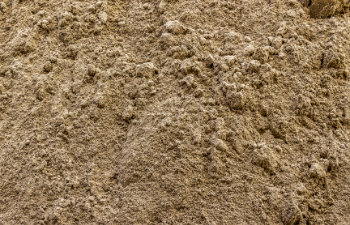
When planning your next landscaping or construction project in the Atlanta area, selecting the right type of sand can make the difference between a professional-looking result and a costly do-over. At GLM Landscape Supply, we’ve been helping Alpharetta, Milton, and surrounding communities make informed decisions about landscape materials for over ten years. Today, we’re breaking down the key differences between masonry sand and river sand to help you choose the perfect foundation for your project.
Both masonry sand and river sand serve important roles in construction and landscaping, but their unique characteristics make each better suited for specific applications. Understanding these differences will save you time, money, and ensure your project stands the test of time.
Understanding Masonry Sand: The Precision Choice
Masonry sand, also known as mason sand or brick sand, is a fine-grained, carefully processed sand that’s been specifically prepared for construction applications. This sand undergoes extensive washing and screening to remove impurities, resulting in a clean, uniform product that meets strict industry standards like ASTM C-144.
Key Characteristics of Masonry Sand:
- Particle Size: Fine, uniform grains typically ranging from 0.5mm to 2mm
- Texture: Smooth, soft finish that’s comfortable to handle
- Color: Usually light tan to beige, providing a clean appearance
- Processing: Thoroughly washed and screened to remove clay, silt, and organic matter
- Consistency: Highly uniform particle size distribution
- Compaction: Excellent compaction properties for stable bases
The manufacturing process for masonry sand involves crushing larger stones and then carefully grading the resulting particles to achieve consistent sizing. This controlled process ensures that you get a reliable product every time, which is why it’s preferred for projects requiring precision and uniformity.
River Sand: Nature’s Time-Tested Solution
River sand is a naturally occurring material formed over thousands of years through the continuous erosion and weathering of rocks in riverbeds. This natural process creates sand with unique characteristics that make it valuable for many construction and landscaping applications.
Key Characteristics of River Sand:
- Particle Shape: Naturally rounded and smooth grains from water erosion
- Texture: Coarser than masonry sand with varied particle sizes
- Drainage: Superior drainage properties due to rounded particles
- Natural Composition: May contain small pebbles and natural minerals
- Environmental Origin: Harvested from riverbeds and banks
- Workability: Excellent for applications requiring good water flow
The natural formation process gives river sand its distinctive rounded edges and varied particle sizes. This variation, while making it less uniform than masonry sand, provides excellent drainage characteristics that are valuable in many landscaping applications.
Performance Comparison: Where Each Sand Excels
Understanding how these sands perform in real-world applications helps you make the right choice for your specific project needs.
- Drainage and Water Management: River sand takes the lead when it comes to drainage. Its rounded particles and varied sizes create natural channels that allow water to flow freely, making it ideal for areas where moisture management is crucial. The spaces between rounded grains facilitate better water movement compared to the tighter packing of uniform masonry sand particles.
- Masonry sand, while offering good drainage, compacts more tightly due to its uniform particle size. This makes it better for applications where you need a stable, firm base rather than maximum drainage.
- Compaction and Stability: Masonry sand excels in compaction due to its uniform particle size and angular edges that interlock well. This creates a stable, solid base that won’t shift over time, making it perfect for applications requiring long-term stability.
- River sand, with its rounded particles, doesn’t compact quite as tightly but provides a naturally stable base that’s less prone to excessive settling. The varied particle sizes help fill gaps, creating a naturally graded material.
- Workability and Mixing: Masonry sand’s fine, uniform texture makes it incredibly easy to work with. It mixes smoothly with cement and water, creating consistent mortar with fewer lumps. The fine particles also make it comfortable for children’s play areas.
River sand offers good workability but may require slightly more effort to achieve uniform mixing due to its varied particle sizes. However, this variation can be beneficial in applications where some texture is desired.
Best Applications for Each Sand Type
Masonry Sand Applications:
- Mortar and Masonry Work: The gold standard for mixing with cement to create smooth, strong mortar for brickwork and stone masonry
- Paver Base: Creates a level, stable foundation for patios, walkways, and driveways
- Pool Installations: Provides a smooth, uniform base under pool liners
- Children’s Play Areas: Safe, soft texture perfect for sandboxes and playgrounds
- Sports Courts: Used in volleyball courts and golf course sand traps
- Plastering and Stucco: Fine texture creates smooth wall finishes
- Landscaping Top Dressing: Levels uneven areas in lawns and gardens
River Sand Applications:
- Drainage Projects: Excellent for French drains and areas requiring water management
- Concrete Production: Natural workability makes it suitable for general concrete mixing
- Landscaping Features: Perfect for creating natural-looking water features and zen gardens
- Backfill Material: Good choice for filling around pipes and utilities
- Equestrian Areas: Often used in horse arenas and stables for its drainage properties
- Garden Applications: Improves soil drainage when mixed with clay-heavy soils
- General Construction: Versatile material for various construction applications
How to Determine What’s Best for Your Project
Choosing between masonry sand and river sand depends on several key factors specific to your project:
- Consider Your Primary Goal: If your main concern is creating a stable, level surface that won’t shift over time, masonry sand is typically your best choice. Its uniform particle size and excellent compaction properties make it ideal for bases and foundations.
- If drainage and water management are your primary concerns, river sand’s natural drainage properties make it the better option. This is particularly important in areas with heavy rainfall or poor natural drainage.
- Evaluate the Application: For precision work like masonry, bricklaying, or creating smooth finishes, masonry sand’s uniformity and fine texture provide superior results. The consistent particle size ensures even mixing and professional-looking outcomes.
- For more general applications or projects where some texture variation is acceptable or even desirable, river sand offers a cost-effective solution with good performance characteristics.
- Think About Long-Term Maintenance: Masonry sand’s stability means less settling and shifting over time, potentially reducing long-term maintenance needs. This makes it worth the investment for permanent installations.
- River sand’s drainage properties can help prevent water-related issues that might require future repairs, making it valuable in moisture-prone areas.
- Consider Your Climate: In Georgia’s humid climate with significant rainfall, drainage becomes particularly important. River sand’s superior drainage can help prevent water pooling and related problems in landscaping applications.
For areas that experience freeze-thaw cycles, proper drainage becomes even more critical to prevent ice damage.
Quality Considerations and Sourcing
What to Look for in Quality Sand: Regardless of which type you choose, quality indicators include:
- Cleanliness: Sand should be free from clay, silt, and organic matter
- Consistency: Particle size should be appropriate for your application
- Moisture Content: Should be appropriately dried for your intended use
- Color Uniformity: Indicates consistent sourcing and processing
Why Source Matters: At GLM Landscape Supply, we carefully source our sand from reputable suppliers who meet our quality standards. Our relationships with top-quality providers ensure that you receive consistent, clean sand that performs as expected.
We test our sand regularly to ensure it meets specifications and provides the performance characteristics you need for your project success.
Cost Considerations and Value
Understanding Sand Pricing: While river sand may sometimes cost slightly less due to minimal processing, the price difference between quality masonry sand and river sand is typically modest. The key is choosing the right sand for your application rather than simply selecting the cheapest option.
Value Beyond Initial Cost: Consider the total project cost, including potential issues from using the wrong sand type:
- Using inappropriate sand can lead to failed installations requiring complete replacement
- Poor drainage from wrong sand choice can cause ongoing maintenance issues
- Inadequate compaction can result in settling and uneven surfaces
Bulk Purchasing Benefits: GLM Landscape Supply offers bulk sand delivery with a minimum order of 4 cubic yards, providing significant cost savings over bagged sand from retail stores. Our bulk pricing makes professional-grade materials accessible for homeowner projects.
Delivery and Installation Considerations
GLM’s Delivery Process: We deliver throughout the Atlanta area within 3-5 days of order placement. Our experienced drivers work with you to place the sand in the most convenient location on your property, considering factors like:
- Accessibility for our delivery trucks
- Proximity to your work area
- Protection of existing landscaping and hardscaping
Calculating Your Sand Needs: Use our recommended formula: Cubic yards needed = (square footage × desired depth in inches) ÷ 324
For example:
- 1 cubic yard covers 648 sq.ft. at ½” depth
- 1 cubic yard covers 162 sq.ft. at 2″ depth
- 1 cubic yard covers 108 sq.ft. at 3″ depth
Preparation Tips: Before delivery, ensure you have:
- Clear access path for delivery truck
- Level area for sand placement
- Tarps if weather protection is needed
- Tools ready for spreading and grading
Professional Installation vs DIY
When to Consider Professional Installation: For complex projects involving precise grading, drainage systems, or structural applications, professional installation ensures proper technique and long-lasting results. Professional installers have experience working with different sand types and understand local soil conditions.
DIY-Friendly Applications: Many landscaping projects using sand are well-suited for DIY installation:
- Garden bed preparation
- Simple paver base installation
- Playground area creation
- Basic drainage improvements
GLM’s Expert Guidance: Our knowledgeable staff can provide guidance on proper installation techniques for your specific project. We’re here to help you succeed whether you’re tackling the project yourself or working with contractors.
Environmental Considerations
Sustainable Sourcing: River sand extraction can impact natural ecosystems, making sustainable sourcing important. We work with suppliers who follow responsible harvesting practices to minimize environmental impact.
Masonry sand production, while involving more processing, often uses materials that might otherwise go to waste, providing an environmentally responsible option.
Project Longevity: Choosing the right sand for your application contributes to project longevity, reducing the need for future replacements and associated environmental impact.
Making Your Decision
Quick Decision Guide: Choose Masonry Sand if you need:
- Precise, uniform particle size
- Maximum stability and compaction
- Smooth mixing characteristics
- Children’s play areas
- Masonry and mortar work
Choose River Sand if you need:
- Superior drainage properties
- Natural, varied texture
- General construction applications
- Cost-effective bulk material
- Good workability for concrete
Still Unsure? Our experienced team at GLM Landscape Supply is here to help. With over ten years of experience serving the Atlanta area, we understand local conditions and project requirements. Call us at (770) 664-8200 to discuss your specific project needs.
Get Started with GLM Landscape Supply
Ready to move forward with your project? GLM Landscape Supply makes it easy to get the quality sand you need delivered right to your Alpharetta, Milton, or Atlanta area location.
Why Choose GLM:
- Over 10 years serving the Atlanta area
- Top-quality materials at competitive prices
- Reliable delivery within 3-5 days
- Knowledgeable staff ready to help
- Minimum 4 cubic yard delivery
- Serving Alpharetta, Milton, Roswell, Johns Creek, and surrounding areas
Contact Us Today: Visit our Milton Landscape Materials Center on Highway 9 or call (770) 664-8200 to place your order. Our team will help you calculate the right amount of sand for your project and schedule convenient delivery to your location.
Don’t let the wrong sand choice compromise your project. Trust GLM Landscape Supply to provide the quality materials and expert guidance you need for professional results that last.
Posted on behalf of
13975 Hwy 9
Alpharetta, GA 30004
Phone: (770) 664-8200
Email: britt.thomas@glmsod.com
Mon-Fri: 8 a.m. - 5 p.m.Sat: 8 a.m. - 12 p.m.
Sun: Closed

